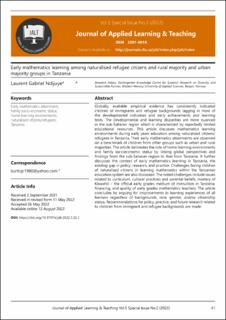| dc.contributor.author | Ndijuye, Laurent Gabriel | |
| dc.date.accessioned | 2023-03-27T08:31:27Z | |
| dc.date.available | 2023-03-27T08:31:27Z | |
| dc.date.created | 2022-09-23T14:44:11Z | |
| dc.date.issued | 2022 | |
| dc.identifier.citation | Journal of Applied Learning & Teaching (JALT). 2022, 5 (Sp. Iss. 2), 41-50. | en_US |
| dc.identifier.issn | 2591-801X | |
| dc.identifier.uri | https://hdl.handle.net/11250/3060497 | |
| dc.description.abstract | Globally, available empirical evidence has consistently indicated children of immigrants and refugee backgrounds lagging in most of the developmental indicators and early achievements and learning tests. The developmental and learning disparities are more nuanced in the sub-Saharan region which is characterized by reportedly limited educational resources. This article discusses mathematics learning environments during early years education among naturalized citizens/refugees in Tanzania. Their early mathematics attainments are observed on a benchmark of children from other groups such as urban and rural majorities. The article delineates the role of home learning environments and family socioeconomic status by linking global perspectives and findings from the sub-Saharan region to that from Tanzania. It further discusses the context of early mathematics learning in Tanzania, the existing gap in policy, research, and practice. Challenges facing children of naturalised citizens in learning mathematics within the Tanzanian education system are also discussed. The noted challenges include issues related to curriculum, cultural practices and parental beliefs, mastery of Kiswahili – the official early grades medium of instruction in Tanzania, financing, and quality of early grades mathematics teachers. The article concludes by arguing for improvements in learning experiences of all learners regardless of backgrounds, race, gender, and/or citizenship status. Recommendations for policy, practice, and future research related to children from immigrant and refugee backgrounds are made. | en_US |
| dc.language.iso | eng | en_US |
| dc.publisher | Kaplan Singapore | en_US |
| dc.rights | Navngivelse 4.0 Internasjonal | * |
| dc.rights.uri | http://creativecommons.org/licenses/by/4.0/deed.no | * |
| dc.title | Early mathematics learning among naturalised refugee citizens and rural majority and urban majority groups in Tanzania | en_US |
| dc.type | Peer reviewed | en_US |
| dc.type | Journal article | en_US |
| dc.description.version | publishedVersion | en_US |
| dc.rights.holder | © 2022 Laurent Gabriel Ndijuye | en_US |
| dc.source.pagenumber | 41-50 | en_US |
| dc.source.volume | 5 | en_US |
| dc.source.journal | Journal of Applied Learning & Teaching (JALT) | en_US |
| dc.source.issue | Sp. Iss. 2 | en_US |
| dc.identifier.doi | 10.37074/jalt.2022.5.S2.2 | |
| dc.identifier.cristin | 2054894 | |
| cristin.ispublished | true | |
| cristin.fulltext | original | |
| cristin.qualitycode | 1 | |

